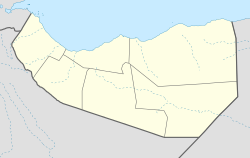Halin, Somaliland
Halin | |
|---|---|
Town | |
| Coordinates: 9°05′10″N 48°37′14″E / 9.08611°N 48.62056°E | |
| Country | |
| Region | Sool |
| District | Taleh |
| Population (2007[1]) | |
| • Total | 540 |
| Time zone | UTC+3 (EAT) |
Halin (Somali: Xalin) is a town in the Sool region of Somalia.[2] It was the headquarters of the Dervish movement during 1903–1904.[3]
Government
[edit]Traditional councils of elders and village assemblies are responsible for administration, and village chiefs are also nominated by councils of elders and assemblies. No elections are held.[4]
The legal system is customary law based on Sharia.[4]
Demographics
[edit]The town is inhabited by the Dhulbahante clan of the Harti sub-division of Darod. It is primarily settled by the Nur Ahmed sub-lineage of the Ugadhyahan Siyad-Mohamoud Garad sub-division of the Dhulbahante.
Environment
[edit]Unusually for the Sool region, Halin has a year-round river.[4]
Annual precipitation is around 100 to 200 millimeters and is subject to frequent droughts.[4]
A legume called Garanwaa, Prosopis juliflora, is under threat as an invasive species.[4]
Economic
[edit]In the past, date palm, sugarcane, and other crops were cultivated and cattle were raised, but the legume Garanwaa, an invasive species, has become a weed, and both crops and pastures have suffered greatly.[4]
Mainly shipped to Qardho, Garowe and other cities in Puntland, as well as to Somaliland and central Somalia.[4]
According to 2019 reports, tomatoes, onions, peppers, lettuce, and cabbage are grown. Residents responding to the report had a monthly income of $160.[5]
Education
[edit]The village has a primary and intermediate school, where about 40 percent of the students are women. It is funded by the diaspora. There is no secondary school in the village, and most families complete their education in intermediate school because they do not have the money to send their children to secondary school in the city.[4]
Medical
[edit]There are no medical facilities in the village, the closest being the hospital in Las Anod. Pregnant women in particular are often at risk.[4]
History
[edit]Harin is an old settlement and was one of the strongholds of Mohammed Abdullah Hassan when he revolted against the British in the early 20th century.[4]
From 1963 until the beginning of the Somali Civil War (c. 1990), there was a date palm agricultural cooperative and the administrative structure was more developed than in surrounding pastoral villages. 800-100 kg of sugar was produced annually in the 1980s.[4]
In December 2013, residents of Halin were evacuated to avoid fighting between the Khatumo State and Somaliland.[6]
The drought that occurred from 2015 to 2017 caused significant damage.[4]
In August 2017, Somaliland election officials were injured during a visit to the Halin district.[7]
In May 2019, heavy rains caused extensive damage to the Harin district.[5]
References
[edit]- ^ WFP Somalia (April 2007). "Puntland Food Security and Vulnerability Assessment" (PDF). Retrieved 2021-06-17.
- ^ "Halin: Somalia". Geographical Names. Retrieved 28 December 2019.
- ^ Jardine, Douglas (2015). Mad Mullah of Somalia.
continued to press for a blow to be struck at the Mullah without further delay, while he was still more or less disorganised. Finally, after much parley, in which the Home Government adhered to the various principles enunciated by them, the plan of operations was to move one column based on Olesan directly against Halin .... All the intelligence received seemed to indicate that the Mullah was still in the neighbourhood of Halin
- ^ a b c d e f g h i j k l Omar J Diriye (November 2019). "SOCIO-ECONOMIC BASELINE ASSESSMENT OF XALIN AT SOOL REGION AND QOOL-DHUXULAALE AT HAWD REGION-SOMALILAND". Retrieved 2022-03-13.
- ^ a b "Taleex: Roobab ka da'ay gobolka Sool ayaa baabi'iyay 350 beerood". radioergo.org. 2019-05-17. Retrieved 2022-03-16.
- ^ "DADKII KA BARAKACAY DEEGAANKA TALEEX OO AY XANUUNNO LASOO DARSEEN". radioergo.org. 2013-12-09. Retrieved 2022-03-16.
- ^ "Qalalaase ka dhashay bixinta Kaararka codeynta doorashada Soomaaliland deegaanno ka tirsan gobolka Sool". hiiraan.com. 2017-08-13. Retrieved 2022-03-16.


